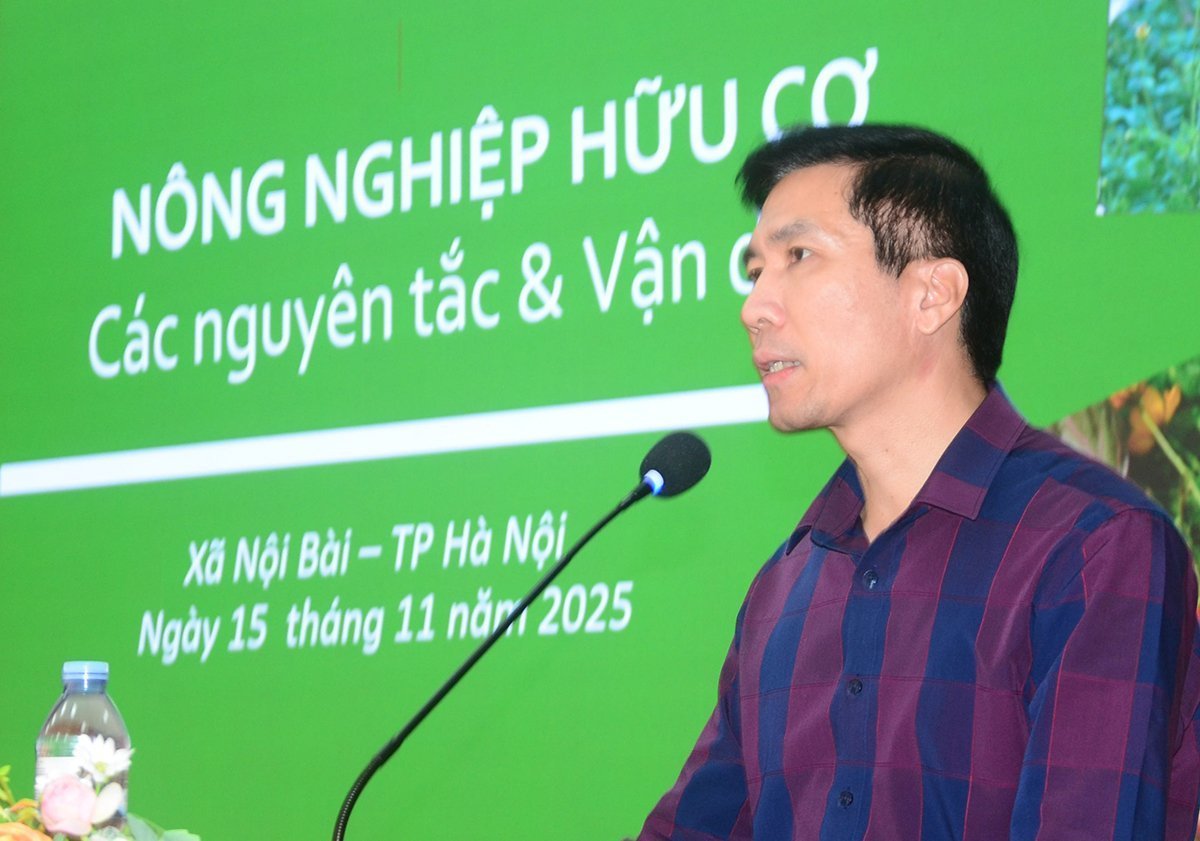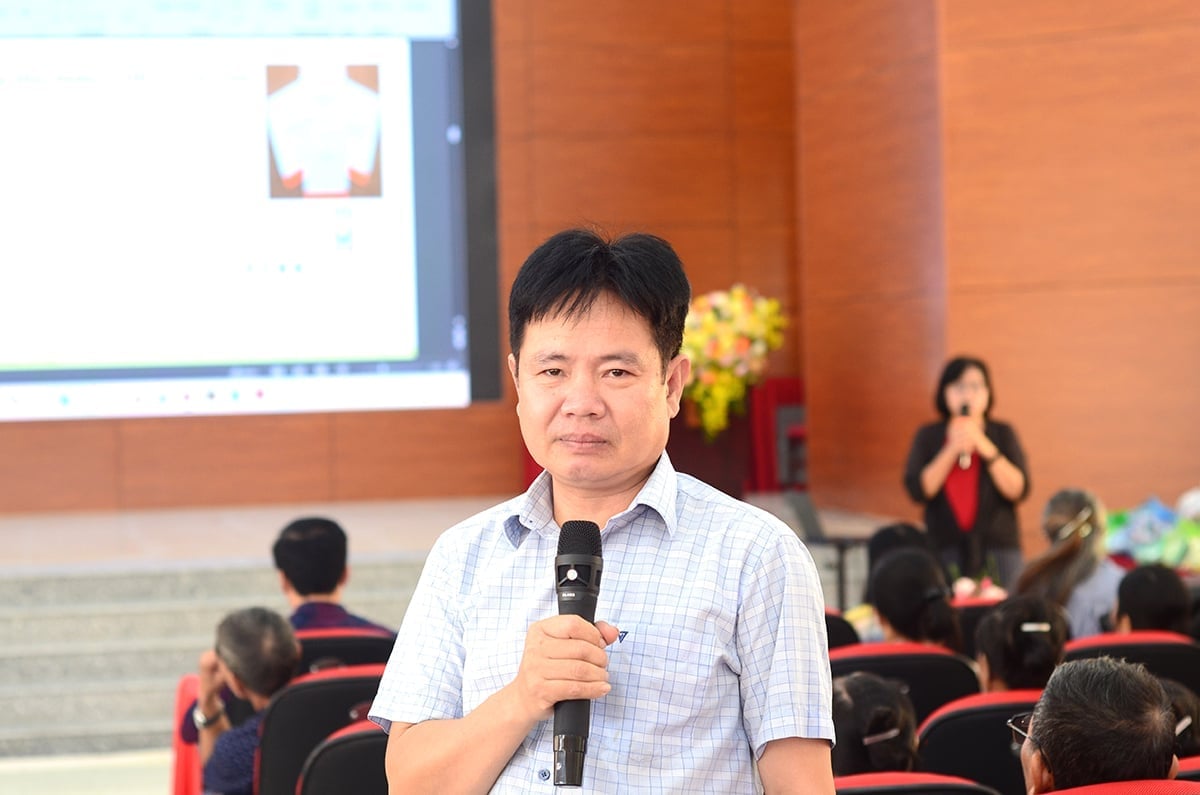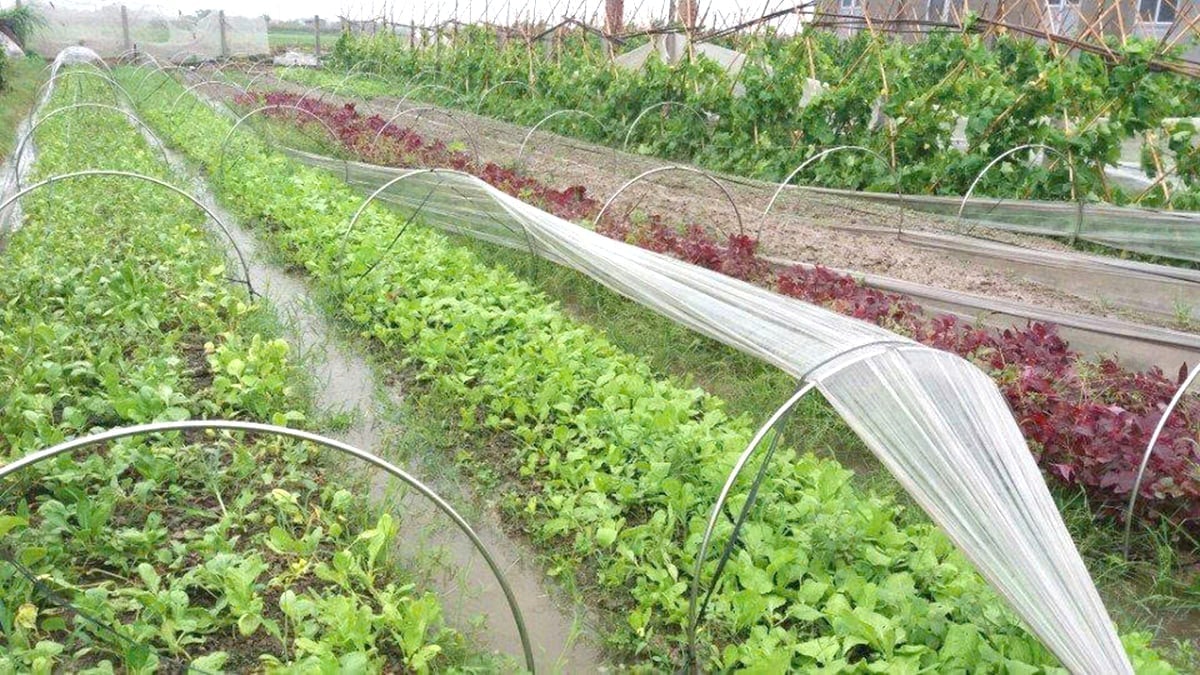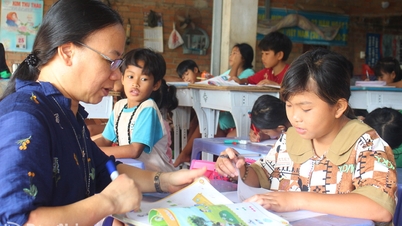Where knowledge ' takes root ' from the soil
The collaboration between the People's Committee of Noi Bai commune and the Vietnam Organic Agriculture Association to organize a training course on organic vegetable production techniques is not just a regular knowledge-sharing session, but also affirms the locality's determination to make organic agriculture, linked with experiential tourism, a pillar of development.

Nguyen Ngoc Tan, Vice Chairman of the People's Committee of Noi Bai Commune, speaks at the training session. Photo: Nguyen Ha.
Nguyen Ngoc Tan, Vice Chairman of the People's Committee of Noi Bai Commune, affirmed that ecological agriculture is a link in a diverse livelihood chain, connecting land, people, and the market. He stated that despite the initial difficulties, they are determined to persistently pursue this model.
In the 'classroom in the field,' there are more than just dry theoretical lectures. Under the guidance of members of the Vietnam Organic Agriculture Association, farmers go directly to the fields, observe the process in the field, compare theory on cultivation techniques, keep production diaries, and learn about the conditions for participating in the PGS (Participatory Guarantee System) right on their own land.
According to PGS Vietnam standards, farmers must adhere to the rule of using 100% no synthetic chemicals and maintain a quality control cycle of at least three times a year. Only with this transparency can Noi Bai organic vegetables maintain their brand and achieve stable selling prices, 1.5 to 2 times higher than conventionally grown vegetables.
This model helps farmers shift from the role of manual laborers to masters of the process. At the same time, it helps them understand that organic farming is not just about avoiding chemicals, but is a comprehensive technical system requiring meticulousness, patience, and a high level of responsibility.
'Keeping the flame of livelihood alive amidst a wave of challenges'
While local vegetable products have entered stringent supermarket chains like AEON, the journey of developing organic agriculture in Noi Bai still faces many challenges. These difficulties accurately reflect the 'struggle' between the traditional economic model and modern agricultural trends.

Mr. Hoang Van Hung, Director of Bai Thuong Organic Agricultural Service and Business Cooperative. Photo: Nguyen Ha.
An analysis by Mr. Hoang Van Hung, Director of the Bai Thuong Organic Agricultural Service and Business Cooperative, has highlighted two core challenges. Firstly, the strictness of the modern market, requiring high quality standards, means that production risks are always present; even a small mistake can lead to the rejection of agricultural products.
With support in terms of taxes, fees, and output, Noi Bai commune expects to expand the area of organic farming to 20-25 hectares in the next 3 years.
Secondly, the biggest challenge lies in human resources, because organic production requires high technical skills, meticulousness, and patience, but it also faces fierce competition from industrial zones. To ensure organic production, approximately 100-120 laborers per hectare per crop are needed, which is 30-40% higher than conventional production.
Ms. Tran Thi Tho, one of the pioneering households, shared her concerns about consumer demand. When supermarket purchasing power decreases, while traditional markets still prefer cheaper, more common vegetables, the cooperative's output is directly affected. This is a systemic problem requiring stronger intervention and support in market connectivity from local authorities and relevant organizations.

A corner of the organic vegetable garden. Photo: Nguyen Ha.
In response to these concerns, Noi Bai commune has committed to continuing its cooperation with the Association and the PGS system to support farmers in terms of technical expertise, production organization, and market connections, demonstrating its commitment to partnership. The ultimate goal is to establish a complete organic vegetable chain, making ecological agriculture a highlight of the locality.
Source: https://nongnghiepmoitruong.vn/canh-dong-tri-thuc-o-noi-bai-d784998.html



![[Photo] National Assembly Chairman Tran Thanh Man inspects election preparations in Hai Phong city.](https://vphoto.vietnam.vn/thumb/1200x675/vietnam/resource/IMAGE/2026/02/26/1772095420401_ndo_br_bnd-8016-jpg.webp)
![[Photo] National Assembly Chairman Tran Thanh Man working with the Hai Phong City Election Committee](https://vphoto.vietnam.vn/thumb/1200x675/vietnam/resource/IMAGE/2026/02/26/1772103806795_ndo_br_bnd-8224-jpg.webp)



![[Photo] Thousands of tourists visit the Quang Trung Emperor Temple in Nghe An during the early spring season.](https://vphoto.vietnam.vn/thumb/1200x675/vietnam/resource/IMAGE/2026/02/26/1772095410680_img-9305-3882-jpg.webp)























![OCOP during Tet season: [Article 4] Elevating local products](https://vphoto.vietnam.vn/thumb/402x226/vietnam/resource/IMAGE/2026/01/29/1769652810578_2935-z6982071462129_649e82db06fb2f2ea701388b1f5f5b0b-173322_176-185229-202804_457.jpeg)
















































































Comment (0)